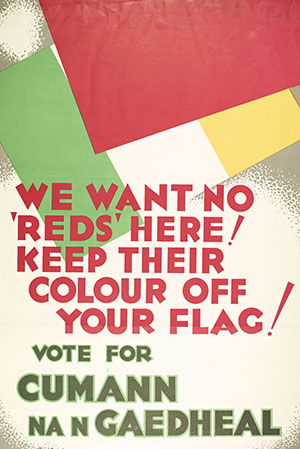March 9
Published in On this Day listing- 1982 The 23rd Dáil Éireann assembled. Charles Haughey was elected taoiseach by a majority of seven, including independent TD Tony Gregory. Gregory’s support had been secured after Haughey signed an agreement with him, pledging development worth £91m for inner-city Dublin.
- 1972 Four members of the IRA were killed when a bomb they had prepared exploded prematurely in Belfast’s Falls Road area.
- 1971 Three off-duty Scottish soldiers, aged 17, 18 and 23, two of whom were brothers, were abducted by the Provisional IRA from a Belfast city centre public house and shot dead on the outskirts of the city.
- 1932 The seventh Dáil Éireann assembled. Eamon de Valera formed the first Fianna Fáil government with the backing of the Labour Party.
- 1932

Above: ‘No “Reds” here’—a 1932 anti-Fianna Fáil Cumann na nGaedheal election poster.
Éamon de Valera, leader of Fianna Fáil, was elected president of the executive council of the Irish Free State. In the run-up to the meeting of the seventh Dáil it was widely rumoured that the outgoing W.T. Cosgrave Cumann na nGaedheal government would refuse to hand over power to the political movement that they had defeated in a bitter civil war nine years before. There were even rumours of a plot by disaffected Free State army forces to stage a coup. During the election campaign the Cumann na nGaedheal government had relied heavily on the ‘red card’, warning the electorate that Fianna Fáil was planning to establish ‘a republic of a Soviet nature’. Dev, in some quarters, was portrayed as a pro-IRA communist intent on Bolshevising the Free State. Fianna Fáil, on the other hand, played the ‘green card’, focusing on issues with which we are all too familiar today, such as jobs, the elimination of waste in the public service, a more equitable distribution of the state’s resources and political reform. Little wonder that large crowds—‘cheering, booing and singing’, according to one report—gathered outside the Dáil and that the atmosphere inside was one of ‘tense excitement’. In the event, however, Fianna Fáil apprehensions were unfounded. Cosgrave adhered to his democratic principles. Before the crucial vote on the formation of a government he was in his office, not plotting a coup but relaxing over a game of pontoon with a senior colleague. At 4.26pm a ‘nervous and pale’ de Valera was elected to lead a minority Fianna Fáil administration with the support of the Labour Party.
















